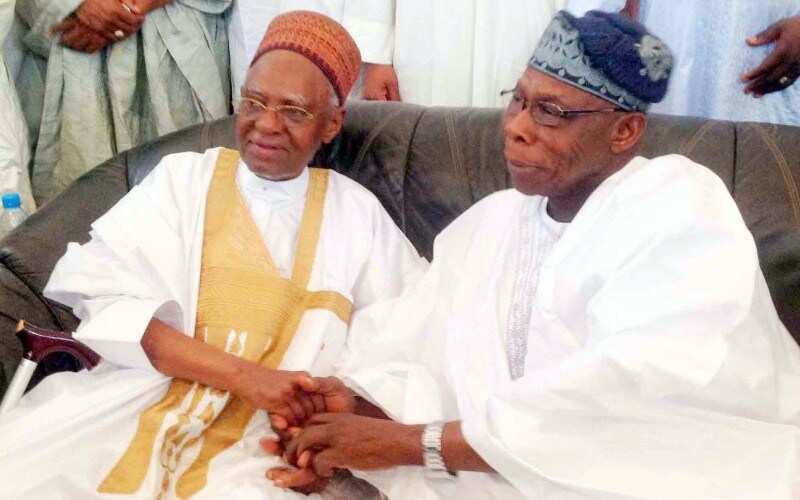- Former president Obasanjo has sent heartfelt message to Governor Tambuwal over ex-President Shagari’s death
- Shagari, Nigeria’s first executive president died on Friday, December 28
- Obasanjo, in his condolence, recalls various positions the late ex-president had occupied
Former president Olusegun Obasanjo on Saturday, December 29, extolled the late former president, Shehu Shagari’s role in Nigeria’s pre- and post-independence politics.
Obasanjo gave the eulogy in a condolence letter addressed to Governor Aminu Tambuwal of Sokoto state, a copy of which was made available to newsmen in Abeokuta, the News Agency of Nigeria (NAN) reports.
He described late Shagari as a humble, patriotic, amiable and notable Nigerian leader.

Obasanjo and Shagari at the latter's 90th birthday in Sokoto. Photo credit: Premium Times
Source: UGC
READ ALSO: Buhari’s tribute to Shagari not sincere - 2nd republic lawmaker tackles president
Obasanjo expressed his deep respect for the achievements of the late Shagari in the course of his long life, describing him as one of the principal actors in Nigeria’s pre-independence and post-independence politics.
“It is with a heavy heart that I am writing to say how deeply grieved I was to hear of the death of His Excellency, President Shehu Usman Shagari.
“On behalf of my family and on my own behalf, I wish to commiserate with you, the entire members of his family and the good people of Sokoto state over the passing of this humble, patriotic, amiable and notable Nigerian leader.
“He held various positions as a parliamentarian in the Federal House of Representatives representing Sokoto West in 1954, as a parliamentarian secretary 1958-1959, as a federal minister and commissioner in different ministries and capacities between 1959 and 1975.
“I remember his role as commissioner for finance, while he and I served in the government of General Yakubu Gowon. He was thorough.
“And later, I saw him as my successor in government as a democratically-elected president of the Federal Republic of Nigeria between 1979 and 1983.
“In all his national assignments, he was forthright, dedicated and showed great commitment in the discharge of his duties.
“He was a unifying force for the nation and his contribution to the growth and development of democracy in Nigeria cannot easily be forgotten.
“In all situations, he lived nobly and he died in nobility.
“President Shagari died at a time the country and its leadership is in dire need of such leadership, experience and wisdom to tackle the multi-faceted challenges facing the nation.
“While expressing our sympathies to you, the family of the deceased and the government and people of Sokoto state, we pray the Almighty Allah grant him eternal rest and give comfort to all those he left behind,” Obasanjo said.
PAY ATTENTION: Download our mobile app to enjoy the latest news updates
Legit.ng had earlier reported that the news about Shagari's death was first broke by his grandson, Bello Shagari.
Bello confirmed that the second republic president, from 1979 to 1983, died at the National Hospital, Abuja, on Friday, December 28, at the age of 93 in a tweet.
“I regret announcing the death of my grandfather, H.E Alhaji Shehu Shagari, who died right now after brief illness at the National hospital, Abuja,” he tweeted.
NAIJ.com (naija.ng) -> Legit.ng: Same great journalism, upgraded for better service! Between
Buhari’s Next Level And Atikulate - Nigerians React| Legit TV
Source: Legit.ng
from Nigeria News today & Breaking Naija news ▷ Read on LEGIT.NG 24/7 http://bit.ly/2EVXbMK
via EDUPEDIA24/7
Comments
Post a Comment